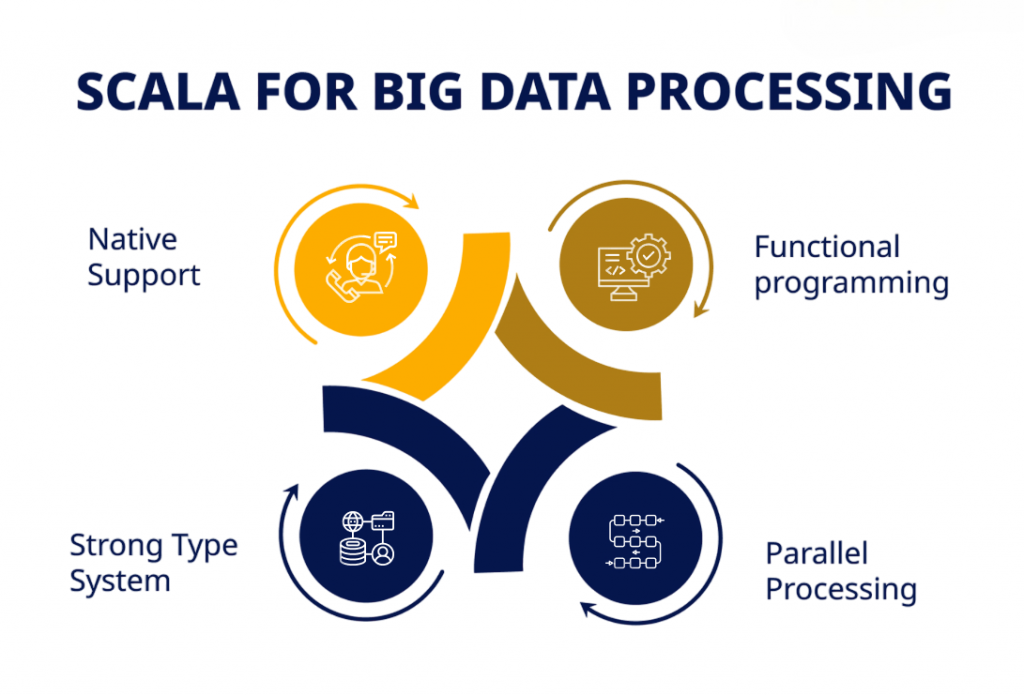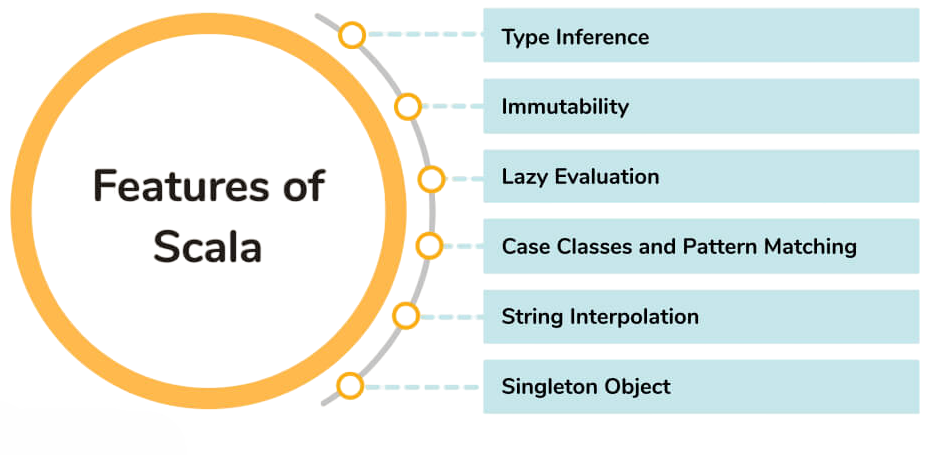
- Introduction
- What is Scala?
- Scala’s Role in the Modern Tech Landscape
- Functional and Object-Oriented: A Hybrid Approach
- Scala and Big Data Technologies
- Industry Demand for Scala Developers
- Benefits of Scala Training Programs
- Scala for Career Switchers and Beginners
- Choosing the Right Scala Training Program
- Conclusion
Introduction
In the fast-moving world of technology, programming languages evolve constantly. While some fade away, others gain momentum due to their versatility and real-world applicability. Scala is one such language that has not only survived but thrived, especially within the big data and enterprise software development spaces. Scala training is increasingly seen as a strategic move for developers, engineers, and data professionals looking to stay competitive in a rapidly evolving job market. To complement this skillset and unlock broader opportunities in analytics and engineering, enrolling in Data Science Training is a powerful next step bridging functional programming with scalable data solutions across real-world platforms. Whether you’re working on large-scale applications, streaming data pipelines, or simply want to adopt a more robust and expressive language, Scala offers the right blend of functionality, flexibility, and performance.
What is Scala?
Scala, short for Scalable Language, is a high-level programming language designed to be concise, elegant, and powerful. It runs on the Java Virtual Machine (JVM), which means Scala can interoperate seamlessly with Java libraries and frameworks. Developed by Martin Odersky in 2003, Scala incorporates both object-oriented and functional programming paradigms, making it a unique and modern tool in today’s software development toolkit. Scala’s syntax is expressive and concise, allowing developers to write less code with more functionality. To deploy Scala effectively in distributed environments, understanding What Is a Hadoop Cluster is essential revealing how scalable compute nodes, resource managers, and data locality principles support high-performance parallel processing. This not only improves productivity but also reduces the potential for bugs and code duplication. Its advanced features such as higher-order functions, pattern matching, and immutability make Scala especially well-suited for complex, distributed applications.
Interested in Obtaining Your Data Science Certificate? View The Data Science Online Training Offered By ACTE Right Now!
Scala’s Role in the Modern Tech Landscape
- In today’s data-driven and service-oriented architecture, the need for efficient, concurrent, and fault-tolerant systems has grown. Scala has risen to meet this need by powering some of the most robust platforms in tech. From Twitter to LinkedIn and Netflix, Scala is used by industry leaders to develop highly scalable, performant backend systems.
- Moreover, Scala is the foundation of many critical big data frameworks like Apache Spark, Akka, and Kafka (originally written in Scala), making it a natural choice for engineers and data scientists working in real-time data processing environments. Its concise syntax, strong static typing, and support for functional programming principles make it highly relevant for modern, cloud-native, and big data applications.
- One of Scala’s defining strengths is its ability to blend object-oriented and functional programming in a coherent and unified manner. While Java developers may be familiar with the object-oriented paradigm, Scala introduces them to functional programming concepts like immutability, first-class functions, closures, and pattern matching.
- Scala training helps learners understand when and how to apply each paradigm effectively. By understanding these advanced concepts, developers can write code that is more modular, predictable, and easier to test, which is crucial in enterprise-grade applications. This dual nature of Scala prepares programmers to think in multiple paradigms and solve problems in more elegant and scalable ways.
- Guided Learning Path: Structured training ensures that learners progress from basics to advanced concepts in a logical sequence.
- Hands-On Practice: Practical assignments and labs reinforce theory and provide real-world context.
- Project-Based Approach: Many training programs include real-world projects that mimic scenarios faced by professional Scala developers.
- Access to Mentors: Instructor-led courses or online bootcamps provide access to experienced developers who can clarify doubts and guide learning.
- Certification: Completing a course often results in certification, which adds value to your resume and validates your skill set.
- Beginners: Should look for programs that start with programming fundamentals and gradually introduce object-oriented and functional concepts.
- Data professionals: Should choose Scala courses that integrate Spark, Kafka, and data stream processing.
- Backend developers: May prefer Scala programs with Akka and Play Framework modules.
To Explore Data Science in Depth, Check Out Our Comprehensive Data Science Online Training To Gain Insights From Our Experts!
Functional and Object-Oriented: A Hybrid Approach
Scala and Big Data Technologies
If you are aiming for a career in big data analytics or data engineering, then Scala is a must-know language. The most prominent big data processing engine, Apache Spark, was originally developed using Scala and offers its most advanced APIs in Scala. Training in Scala allows developers to interact directly with Spark’s core APIs, enabling more efficient memory usage and parallel computation.

In addition to Spark, Scala is often used with Akka (for concurrency), Kafka (for streaming), and Apache Flink, providing a full stack of tools for building real-time data platforms. To master this ecosystem and build production-grade solutions, enrolling in Data Science Training is a strategic move equipping professionals with hands-on experience across distributed frameworks, stream processing, and scalable architecture design. By learning Scala, professionals can unlock high-performance data processing workflows, leverage the functional style for cleaner ETL pipelines, and contribute to distributed systems with confidence.
Gain Your Master’s Certification in Data Science Training by Enrolling in Our Data Science Master Program Training Course Now!
Industry Demand for Scala Developers
As the demand for big data and scalable backend systems rises, so does the demand for Scala developers. While Scala is not as ubiquitous as JavaScript or Python, it holds a niche but premium position in the tech industry. Companies hiring for big data roles often list Scala as a required or preferred skill, particularly for positions involving Spark, Kafka, or reactive programming. To work effectively in such environments, understanding Dedup: Splunk Documentation is essential especially when managing log data, filtering duplicates, and optimizing search queries across large-scale machine data pipelines. Job platforms regularly list roles like “Big Data Engineer with Scala”, “Scala Backend Developer”, and “Data Engineer with Scala and Spark”. These roles often come with above-average salary ranges, given the specialized knowledge required. Scala professionals are especially valued for their understanding of functional programming and distributed systems.
Are You Preparing for Data Science Jobs? Check Out ACTE’s Data Science Interview Questions and Answers to Boost Your Preparation!
Benefits of Scala Training Programs
Enrolling in a structured Scala training program offers multiple benefits: from mastering functional programming concepts to building scalable data applications. To apply these skills in real-world scenarios, understanding What is Data Pipelining is essential revealing how data flows through extraction, transformation, and loading stages, and how Scala can be used to orchestrate efficient, fault-tolerant pipelines across distributed systems.

Whether self-paced or instructor-led, quality Scala training enables faster mastery and real-world application.
Scala for Career Switchers and Beginners
For those coming from a Java background, learning Scala is a natural next step. Since Scala runs on the JVM and supports Java libraries, Java developers can leverage their existing knowledge while embracing more modern programming paradigms. Even for beginners, Scala offers a fresh and future-proof way to enter the software industry. While it may appear complex at first due to its powerful abstractions, proper training simplifies these concepts and builds confidence. To complement this skillset with log parsing expertise, understanding What is Splunk Rex is essential revealing how regular expressions can extract, transform, and enrich machine data for smarter analytics and faster debugging. Moreover, Scala is often used in startups and data-centric roles, which gives learners opportunities to join exciting, cutting-edge projects early in their careers.
Choosing the Right Scala Training Program
With several Scala training options available ranging from free tutorials to enterprise-level bootcamps, it’s important to choose the program that fits your goals. To align your learning with real-world data architecture, understanding What is Azure Data Lake is essential revealing how cloud-native storage and analytics platforms support massive-scale data ingestion, transformation, and machine learning workflows.
Look for programs offering hands-on labs, instructor support, certification, and community engagement for best results. Popular online platforms like Coursera, Udemy, and EdX offer introductory Scala courses, while more intensive Scala training is available through big data institutes and tech academies.
Conclusion
In a tech landscape where speed, scalability, and reliability are everything, Scala has proven itself as a language that can handle modern demands. Its strong ties to big data, compatibility with Java, and support for functional programming make it one of the most strategic skills to invest in. To capitalize on these strengths and stay ahead in the data-driven economy, enrolling in Data Science Training is a smart move equipping professionals with the expertise to build scalable pipelines, leverage distributed systems, and apply functional paradigms in real-world analytics. Scala training opens up doors in data engineering, backend development, and high-performance computing, placing professionals at the forefront of innovation. Whether you’re a seasoned developer or an aspiring engineer, mastering Scala through quality training will give you a solid foundation to tackle the challenges of modern software development with confidence.


